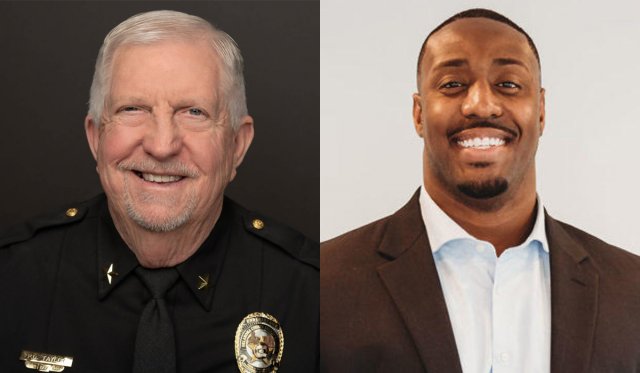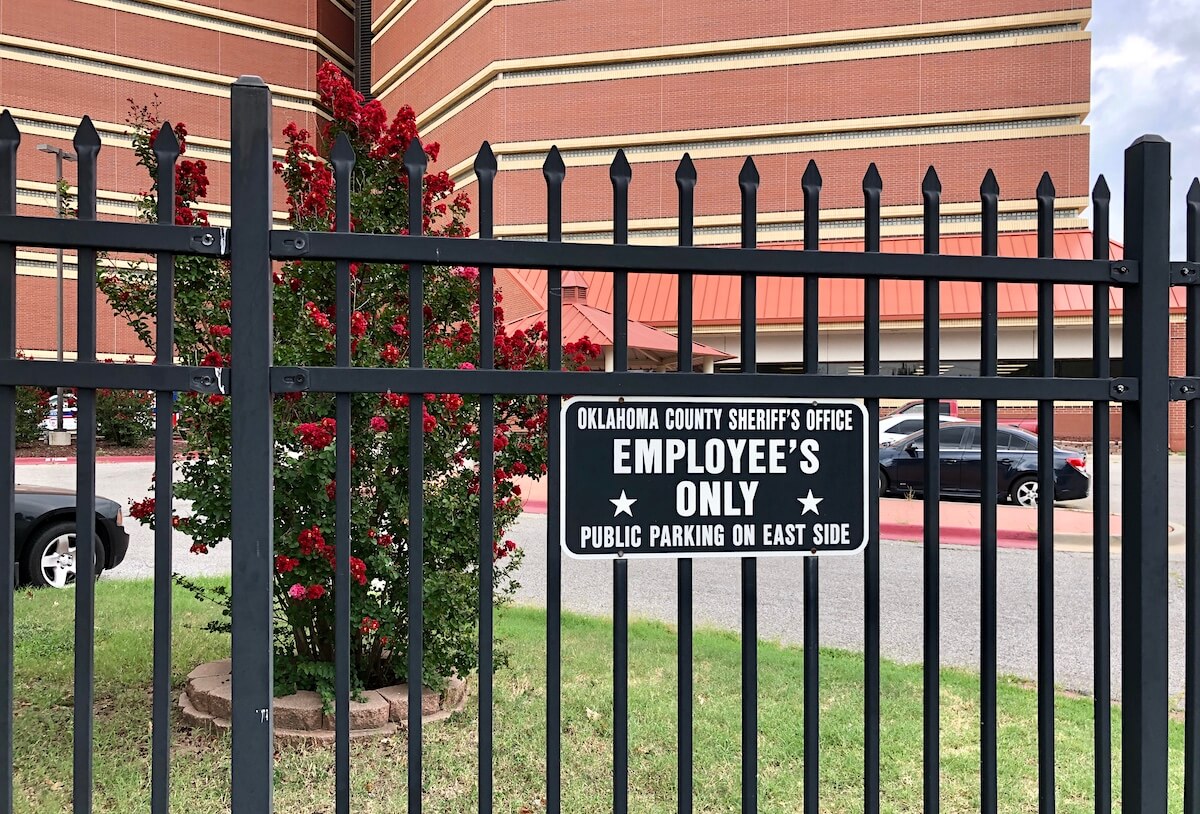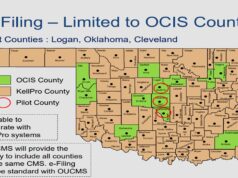

The Republican runoff for Oklahoma County Sheriff pits a veteran law enforcement officer against a political newcomer, stirring up a race highlighted by a need for fiscal responsibility, serving warrants, commitments for more law enforcement presence in rural areas and trust.
Incumbent Oklahoma County Sheriff P.D. Taylor will face Norman police officer Tommie Johnson III in the Republican primary runoff Aug. 25.
First elected in a 2017 special election, Taylor finished the June 30 GOP primary ahead by about 9,000 ballots, but that only equaled 48.3 percent of the vote. And while Taylor said in an interview that he was excited about the outcome, he acknowledged he would have liked to have won the primary outright to focus on general election opponent Wayland Cubit, a longtime Oklahoma City police lieutenant.
“I’ve just got to keep working hard like I have been. I feel like I got a really good support base group out there that’s supportive of me,” Taylor said. “It is what it is.”
Johnson, a Black officer in the Norman Police Department who drives a patrol car 10 hours a day for four days a week, said he didn’t know the weight of carrying an incumbent to a run-off.
“I’m not a politician. I’m a cop, and I love protecting communities. I knew I was going to work hard in this and to do my best. I’ve always had to outwork the competition,” Johnson said. “I respect [Taylor] with all my heart. He’s given a lot to this profession and has done it a long time. He’s a hall-of-fame officer. That is a big time.”
Taylor has 49 years of service in law enforcement and is running his campaign on the slogan, “experience matters.”
“There are several people running who don’t have the experience to be Oklahoma County Sheriff in my opinion,” he said.
If re-elected, Taylor said he plans to continue focusing on patrolling unincorporated areas within the county. He would like to reinstate warrant teams, lower response time on emergency calls and review current operations to “fix what’s broken.”
“An issue prior to me being sheriff was a lot of people were building up comp time, and we’re so busy we couldn’t use the comp time,” Taylor said when asked his accomplishments during his tenure. “[I’m] talking about getting the same money that my predecessor got. But we were able to pay our bills, give raises, help fix the jail.”
Johnson’s time in law enforcement has spanned almost a decade. He first became an officer in the University of Oklahoma’s Police Department before getting a job with the Norman Police Department.
“I know how departments work,” Johnson said. “When you talk about experience — and from what he’s saying, I understand that he’s going to run off ‘experience matters.’ Well, sir, if experience matters, then why is Oklahoma County where it’s at today?”
Along with experience, Johnson said leadership should matter as well.
“I think we need better leadership in a fresh perspective of what we are doing in Oklahoma County. I’m not so prideful that I would just go out willy nilly and start doing stuff,” Johnson said. “To accomplish the goals I want to accomplish, I would create a team around me. Because it’s not me that gets it done. It’s ‘we’ that gets it done. I just provide the plan, the vision — this is how we go.”
Johnson, a resident of south Oklahoma City who received 33 percent of the June 30 primary vote, stated goals that include safer communities, fiscal responsibility and partnerships.
Taylor stressed that Johnson’s experience should be of importance when talking about the campaign.
“I think [Johnson’s] plan is that he doesn’t have a plan. He’s been a policeman in Norman for five years. It’s my understanding that he’s an officer. When you look at my experience, I’ve led a large agency, I’ve got experience in handling large budgets,” Taylor said. “I think Mr. Johnson is a good man. He just lacks a lot of experience. I don’t see where he has any experience to be the sheriff of such a large county and such a large agency.”
‘Integrity matters more’: Johnson lands endorsements
One of Taylor’s former employees — who also challenged him in the GOP primary — apparently disagrees.

On the night of the primary, Johnson received an endorsement from the Republican primary’s third place finisher, Mike McCully. Johnson also gained endorsements over the weekend from former Oklahoma Gov. Frank Keating, former U.S. Rep. Steve Russell and former Oklahoma City Councilwoman Beverly Hicks.
“Experience has value — but integrity matters more,” Russell said in a statement provided to NonDoc. “In a community that is struggling to find leaders with integrity, grit, and can actually get out and work across the spectrum to solve problems while being committed to protect our community, they can find it in Tommie Johnson.”
Keating also praised Johnson.
“Tommie Johnson is the conservative change we need in the Oklahoma County Sheriff’s Office. He will put the safety of our families first, preserve law and order and be effective from day-one,” Keating said in a statement. “Tommie will restore confidence between the public and law enforcement officers protecting us. I’m proud to endorse him.”
Hicks said she visited with Johnson on the phone and was impressed with what he had to say.
“I just feel like it’s time for a change. I know he was with the OU police and the Norman police,” Hicks said. “I like his youth.”
Taylor, meanwhile, has received endorsements from former OU football coach Barry Switzer as well as the Oklahoma County Sheriff’s Office Fraternal Order of Police. Taylor served as president of OKCPD’s FOP Lodge 123 from 1984-1997.
“As an Oklahoma County business owner, I believe we all deserve the best-qualified candidate,” Switzer said in a campaign ad for Taylor. “I’ve known P.D. Taylor for many years. He has dedicated his life to public safety.”
Taylor has also received endorsements from multiple former and current officials within Oklahoma County, including Oklahoma House Majority Floor Leader Jon Echols (R-OKC), former Oklahoma Lt. Gov. Todd Lamb and former OKC Mayor Ron Norrick.
The duties of the sheriff and ‘special revenue’

For 2020 and beyond, the duties of the Oklahoma County Sheriff’s Office are more narrow than they once were. On July 1, operation of the Oklahoma County Jail officially moved into the hands of the new Oklahoma County Jail Trust. That leaves the main responsibilities of the sheriff’s office as patrolling rural areas of the county, serving warrants and providing Oklahoma County Courthouse security.
As county officers are responsible for being dispatched to unincorporated areas or small towns like Spencer, Arcadia and Jones, one constant worry is the office’s budget.
According to Oklahoma County budget reports, the sheriff’s office general budget for Fiscal Year 2020-2021 is $10.1 million. For comparison, OKCPD’s general budget for FY 2019-20 is $204 million.
Myers said 98 percent of the general budget goes to salaries and benefits. He said all operations and capital purchases are done through special revenue that the sheriff’s office collects through the year. The office reported $2 million in special revenue in this year’s budget report.
OCSO employs 16 civilian dispatchers along with a total of 143 commissioned deputies. Of those, 24 are in the patrol unit and 22 are courthouse protection officers. Others serve in separate departments or as school resource officers.
“My responsibility is 100 percent law enforcement. I’m going to try to at least build up our budget so we can function,” Taylor said. “There’s no more defunding that we can stand and still continue to do our job. I’m talking about patrol division — bare bones minimum. We’ve got to have more bodies in the patrol division (and) be able to provide police service to unincorporated areas.”
Johnson also said OCSO law enforcement should be a priority as rural areas are in need of police presences in their communities.
“Let’s patrol the areas that we are responsible for and let’s provide a presence for the areas that we are responsible for,” Johnson said. “The jail is not an issue. Now we can worry about keeping communities safe. That’s something I can accomplish, and that’s something we can do day one. Police presence deters crime, stops crime — it’s the number one thing effective in crime prevention.”
Johnson said OCSO needs to be responsible and transparent with its money management.
“There has been a long, long, long history of money mismanagement at the Oklahoma County Sheriff’s Department,” he said. “Fiscal responsibility simply means we are going to be responsible with our money and the way we spend it.”
Taylor noted a way for OCSO to generate more money is by enacting a countywide sales tax.
“Now Oklahoma County — it to me is the front-runner, the big-dog county in Oklahoma,” Taylor said. “Oklahoma County is the only county in Oklahoma that doesn’t have a countywide sales tax.”
Johnson said he isn’t too familiar with the contents of the county’s budget, but said he would look into allocating funds for hiring more officers.
“It’s about officer retention, because at the sheriff’s department, you don’t get paid very well,” Johnson said. “This job is dangerous and takes you away from your family.”
Johnson said he would allocate more funds toward community-oriented policing.
“Have guys dedicated to getting out in the community. Engaging. Going to city events within the county and being visible with what we do,” he said “When they see you — especially when they start to build a bond with the cops — it’s not just a guy in a uniform. Through that relationship that we built because we are there, they’ll come to us with problems. When you invest in your community, you unconsciously give them permission to have ownership of their own safety. And then they will turn and invest information (…) which we all can use to keep us safe.
Candidates cite goals to build trust in law enforcement

Whoever prevails between Taylor and Johnson will face OKCPD Lt. Wayland Cubit, who won the Democratic nomination for Oklahoma County Sheriff on June 30. Like Johnson, Cubit is a Black man attempting to unseat the incumbent sheriff, and he panned Taylor’s plan to take care of 30,000 warrants.
“What we hear now is that our community does not trust law enforcement,” Cubit said. “The community could care less about how many warrants that [OCSO] actually brings in.”
Cubit cited mistrust in law enforcement as an issue that needs to be addressed early on.
“All of those things — although they might fall under the umbrella and the duty of the sheriff — we do have to bring people in because of warrants. We do have to be physically responsible and transparent with the property and funds of taxpayers,” Cubit said. “But none of that seems to matter if the community doesn’t trust us.”
Taylor said his drive to take care of the backlog of warrants is based on arresting the “worst of the worst.” He pointed toward people wanted for homicide, kidnapping, rape and domestic abuse.
“I think the overwhelming community wants the really violent people that have committed a heinous crime, they want them — at least to go through the court system and be held accountable,” Taylor said. “It’s going to take a culture change.”
Johnson said that serving warrants is important but that he will make a change in the handling of nonviolent crimes.
“There’s a lot of petty larceny, a lot of traffic citations that people can’t pay — whatever the case may be — that generates a warrant,” Johnson said. “We should have a new approach to that.”
Cubit won the Democratic primary over Virgil Green, a former police chief for the towns of Boley and Spencer, with more than 67 percent of the vote.
“I feel really grateful that so many people bought into the vision that I laid out for the sheriff’s office,” Cubit said in an interview. “It was a big victory — it was an overwhelming victory. It goes to tell me that the message that people want to get behind was something that I was saying.”
Cubit is a 21-year veteran of the Oklahoma Police Department and has devoted the past 12 years of his career to creating and supporting programs that help at-risk-youth. Stated on his campaign site, Cubit’s platform is based on transparency, accountability, mental health and criminal justice reform.
“Neither one of those opponents have the vision that I’ve laid out for our county. I seem to think that both Republicans and Democrats can see that I have a message and a vision for the sheriff’s office that fits everybody,” Cubit said. “[It is a vision] that everybody can get behind. I have the experience, knowledge and body of work to pull it off.”
Cubit cited mistrust in law enforcement as an issue that needs to be addressed early on.
“We have to have a leader who is focused on bringing the type of physical responsibility that people trust,” Cubit said. “And actually want to give them the authority. We talk about community policing — we can’t do any of the other stuff like address social media technology, policy and oversight — all those things have to be done. But if they don’t trust us, why do we do them?
Taylor said he thinks there is a lot of reason for trust with his department.
“Don’t judge an entire professional bunch of people. In law enforcement, the overwhelming majority of people — they’re in it for the right reasons. They made a career out of it,” Taylor said. “Are there some bad ones? Certainly. But the Oklahoma County Sheriff’s Office — we’ve really been different in this whole deal.”
Johnson said building trust starts by building partnerships with civic leaders, law enforcement partners, first-responders and mayors.
Taylor said he and OCSO listened and took a different approach to protests in support of “Black Lives Matter” after the death of George Floyd while in the custody of the Minneapolis Police Department.
“Our deputies were out there, and we were interacting and relating with the protesters,” Taylor said. “I saw my deputies shaking hands. Hugging. My deputies took a knee with protesters. We support the protesters 100 percent. I think we totally handled it differently. That’s a real positive. Part of it is the quality of our employees. Part of it is training. Part of it’s luck. But our law enforcement side has done an outstanding job. We don’t get complaints. We don’t get lawsuits. We don’t get any of that. And a big part of it is the kind of people we hire and the training we give them.”
Johnson said he doesn’t support the national BLM organization because he believes it is far more than “Black Lives Matter.” But as a statement, he said there’s nothing wrong with it.
“I believe all lives matter,” Johnson said. “But when you talk about the Black Lives Matter movement, at least here locally with our law enforcement partnerships in our community, we say, ‘Hey, we want some things to change.’”
Johnson said he agrees with Taylor when he says law enforcement, especially in Oklahoma, is doing a good job of trying to get out into the communities. Johnson noted the Citizens Advisory Boards, which invite people into police departments.
“That is that start of building that trust,” Johnson said. “It’s letting people in.”
Mental health within the sheriff’s office

Cubit said he believes Taylor and Johnson should officially prioritize mental health as a plan in their campaign.
“In their plan, they don’t mention mental health, and I do,” he said. “It’s fundamental that we are going to have to partner with mental health professionals. They are talking about warrants and fiscal responsibility, but are they building trust with other agencies they want to deal with the mental health crisis that we deal with in our county? Those are the contrasts in our methods.”
Even though mental health is not stated in Taylor’s official campaign plan, he did acknowledge that it is a problem in the county jail. While Taylor’s office no longer runs the beleaguered jail, he does serve as a member of the new trust.
“The youth, education, mental health programs — that’s one of the biggest problems with the Oklahoma County Jail. Because the state, in their great wisdom, has cut out all the funding for various places to address mental health. So where do those people wind up? They are dumped in the county jail,” Taylor said. “The county jail doesn’t have the training facilities (or) money — they don’t have anything to handle those issues. They do the best they can. But you can’t shut down 90 percent of all the mental health facilities in the state of Oklahoma. The jail — that’s the last place they should be. But the [jail] has become a dumping ground because [mental health treatment programs] are not being funded.”
Johnson said he thinks police have been used to handle mental health crises too much.
“I think that police punishment has been used to solve mental health issues for far too long,” Johnson said. “I really feel like we’re trained. We do receive training in mental health, but we’re not doctors. We’re law enforcement officials.”
Each year, all full-time OCSO deputies are required to have a minimum of at least two hours of mental health training, Myers said in an email.
“It takes everyone on the same page. It takes everyone working together,” Taylor said in regards to mental health. “I don’t care if it’s law enforcement or whatever.”
(Correction: This post was updated at 10:59 a.m. Wednesday, July 22, to reflect Taylor’s presidency of OKCPD FOP and at 1:02 p.m to include endorsements he gained and updated again at 12:10 p.m. to clarify that information.)




















